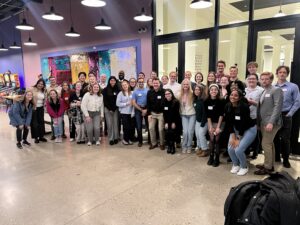This post, by the Assistant Director of Student Affairs, is the fourth in a series of weekly blog posts this semester concerning the work of the Office of Student Affairs. The first, by Dean Kearney, can be found here, and the second and third, by Assistant Dean of Students Anna Fodor, are available here and here.

Student organizations are a staple at educational institutions, including Marquette University Law School. These organizations offer students opportunities to form their own smaller communities within a larger institution. Here at Marquette Law School—whether driven by a particular practice area, an aspect of students’ personal identity, or a legal philosophy—student-run organizations offer a way for future Marquette lawyers to build connections with their peers and beyond. It might even surprise some to learn how much these “outside of the classroom” interactions shape a student’s development, contribute to identity formation, and can affect student retention and performance.[1]
Registered student organizations[2] are the one aspect of the law school experience run by students, for students. They are completely voluntary and extracurricular, with no academic prescriptions or curricular incentives for holding or attending events (on the other hand, free food, no mean incentive, is widely available); the interests and activities of students entirely drive these communities. Through them, students help create the “culture” at a particular school. How active (or inactive) an organization is, what it chooses to do, which speakers it brings to campus, how inviting and inclusive its programs are—all of these affect a law school’s culture and the student experience.
Let me give a quick highlight of our Marquette Law School student organizations and some representative engagement opportunities:
- 35+ active organizations
- 80+ meetings, speakers, panels, socials, and networking events during the Fall 2023 Semester
- 150+ student leadership positions
Forum “tabling” events are quick and small ways by which students can engage with each other, with a fun “swing by for a few minutes” vibe; a few examples:
- The Organization for Student Wellbeing’s Savor the Sips social tabling
- Hispanic Latino Law Students Association’s monthly Taco Tuesday fundraiser
- Student Bar Association’s Welcome Back donuts
For organizations that host a guest speaker or panel of speakers, each event brings in practicing attorneys, judges, or experts in their field to discuss legal issues. Recent examples include:
- Labor and Employment Law Society’s AI and the Workforce panel
- The Federalist Society’s speaker event with the Hon. Michael Brennan discussing Biden v. Nebraska and federal student loan debt
- Out and Allies speaker event to discuss LGBTQ+ Issues in Education
Social and networking events allow our students to build lasting friendships, meet practitioners, and gather outside of Eckstein Hall. At one point or another, almost all of our organizations host networking events with their professional chapter equivalents or local bar associations. A sampling of RSOs’ recent social and networking events:
- Sports Law Society’s annual Brewers tailgate and game
- Real Estate Law Society’s monthly happy hour
- First Generation Professionals’ annual first-gen mixer
- Asian Law Students Association’s fall boba tea gathering
And a few signature events get the entirety of the student body, often along with faculty and staff, involved, engaged, and feeling like part of our greater community. These include:
- Canned Immunity, the collaborative week-long donation drive spearheaded by our Association for Women Lawyers to collect canned goods and food for local community food banks. Interested professors grant “on call” immunity during the week for students to bring in a donation.
- The Period Products Initiative, led by the Ruth Bader Ginsburg Society and the Office of Student Affairs, provides free period products in the women’s bathrooms throughout the building. The students ensure that the boxes are filled while the Office of Student Affairs purchases and maintains the inventory.
- Barristers’ Ball is the Student Bar Association’s annual signature formal event. It recognizes all the work put into the year by the students and provides a highlight to celebrate the end of another great year.
So, if all this is “by the students and for the students,” what do I even do around here?
Well, I work to make it all happen. At the beginning of each academic year, I provide training to the more than 150 student leaders, going over policies and procedures to help them think about and plan these events. Working with law school colleagues, I organize the students (or the events) so that we avoid major scheduling conflicts, reserve spaces for their meetings, coordinate complimentary parking for their guests, help track their budgets, and process reimbursements and payments, among other things. In my experience, you never get to know people better than by working on a project with them, and it’s one of my favorite things to get to see a new idea blossom into a successful community event (looking at you, SBA Chili Cook-off!)
Our student-run organizations foster connections and enrich our Law School, and we, in turn, do our best to support their efforts to reach their own goals. We do this because, ultimately, national research and local experience show that the more that our students engage with each other, the more they feel they belong to our law school culture—and, by extension, in the legal profession as a whole.
[1] Give Chickering’s seven vectors or Astin’s theory of involvement a good Google. They help form the foundation of student development theory.
[2] Registered student organizations (RSOs) are groups that are completely voluntary and where students do not receive any sort of academic credit for their work. So law journals, moot court, and client skills work typically fall outside this category. The Public Interest Law Society, by contrast to both these co-curricular organizations and RSOs, falls into what might be called a department-sponsored organization category.
